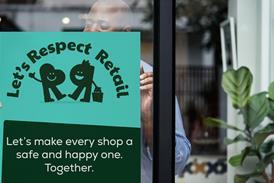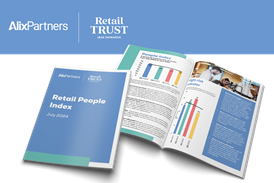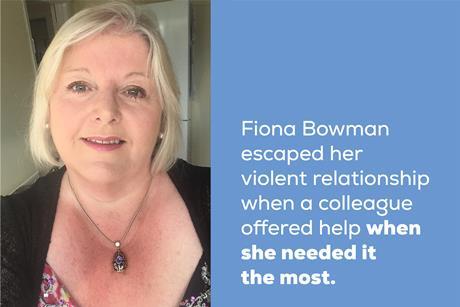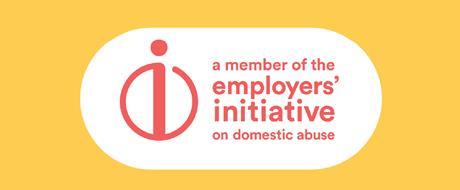It’s time to come together and tackle domestic abuse.
Retailers like you have a unique opportunity to help employees who are experiencing domestic abuse, here’s how.
Employers don’t just have a responsibility to look out for their employees’ wellbeing while they’re at work. Being supportive extends to offering help when colleagues are going through a difficult time at home, too. To support businesses who want to make a difference, our retail industry against domestic abuse (RIADA) campaign brings together retailers who are pushing for change within the industry.
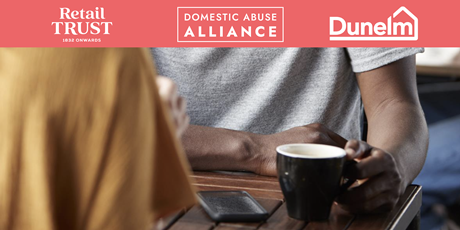
Content warning: Whether you’re currently directly affected by domestic abuse, you have been in the past, or know someone who is struggling, the following content may bring up difficult feelings.
If you are in immediate danger or are reading this article on behalf of someone who is, please contact 999 immediately.
A quarter of women and one in six men will be affected by domestic abuse at some point in their lifetime, whether they experience physical, sexual, emotional or financial abuse. Tragically, two women a week and one man a month will lose their lives as a result – so we’re urging retailers, who are in a unique position to help, to join us in standing up against it.
From a step as simple as displaying helpline numbers in your staffroom, to arranging an employee’s transfer to another branch, we in the industry can all do something to help tackle abuse. The Retail Trust has produced a range of resources, including a manager’s guide that outlines the key signs of domestic abuse and the most appropriate ways to offer help, an organisational policy template, plus you can also access membership of EIDA.
“As a coalition of retailers, we have an unrivalled ability to raise awareness of domestic abuse within the retail sector and the communities we work in,” explains Cliff Lee, director of wellbeing at the Retail Trust. “By working together as a collective voice, retail has real power to make a change.”
“The home should be a place where you feel comfortable and safe, but we know this isn’t always the case,” adds Josie Dickinson, inclusion, diversity and wellbeing senior manager at Dunelm. “We’ve worked alongside the Retail Trust to create a manager’s guide and policy as a starting point, and are going to be training all our managers on domestic abuse awareness and signposting, too. As part of the campaign, we feel a real sense of responsibility to educate and support our colleagues.”
Former bank clerk Fiona Bowman, 64, knows first-hand how important raised awareness can be. “Whenever my husband was violent towards me, I learned to hide it from my employers and colleagues, and came up with a catalogue of excuses for my injuries,” she says.
“You’ll tell people everything’s fine when it’s not – and even though they might know you’re not really ok, they often don’t have the courage to ask more questions. That’s why it’s so crucial for retailers to understand the signs of domestic abuse, and reach out a helping hand when they can. Simply saying, ‘I know you might be having a hard time at the moment, but I’m here if you need me, and I will try to help you,’ could be all it takes.”
Fiona was able to leave her violent marriage thanks to the actions of a sympathetic manager, who was called to the hospital after she was badly injured.
“Until that night, I didn’t have any inkling about what Fiona was going through,” says Graham Whittaker, Fiona’s boss at the time. “But when I saw her in hospital, her injuries were so bad she was unrecognisable. She eventually admitted she was suffering domestic abuse, and seemed relieved to be able to talk to someone she knew she could trust.”
Graham took one simple step, contacting his HR department, “And they took over from there.” They arranged Fiona’s transfer to another branch of the bank 400 miles away, so she could escape her abusive husband without losing her job, and gave her the time off she needed to start rebuilding her life.
Fiona’s story highlights the crucial role retailers can play in tackling abuse. As well as offering a space where those experiencing it can safely ask for help, subtle warning signs – such as regular lateness or excessive anxiety about time-keeping – might become more obvious at work.
By Rosie Mullender
Reaching out can make all the difference
Fiona Bowman, 64, escaped her violent relationship when a colleague offered help when she needed it the most

These are just some of the reasons the Retail Trust is urging everyone to come together to tackle domestic abuse – and once you’ve joined us, we’re asking members to make three key pledges:
- Create a domestic abuse policy for your workplace
- Join the Employers’ Initiative on Domestic Abuse (EIDA)
- Educate your managers
Create a domestic abuse policy for your workplace
A formal commitment to tackle abuse will make it easier for colleagues to speak out. It will raise awareness among staff, help them identify the signs to look out for, and show them how to offer help. The Retail Trust has examples that your business can use to develop your own personalised policy.
Join the Employers’ Initiative on Domestic Abuse (EIDA)
Employers can play a key part in tackling domestic abuse, and the EIDA commissions reports into domestic abuse, provides materials to support managers, and offers employers handy toolkits. Membership is free.
Educate your managers
If you want to do something to help, but are not sure how, the Retail Trust offers a wealth of resources for you to tap into, including our manager’s guide on how to spot abuse, and how to tackle it if you do. We can also provide CPD certified training sessions specifically aimed at helping managers to understand the different types of abuse – and how to recognise the signs. Join us, and we’ll help you to support your staff.
The Retail Trust also offers a number of services to support those affected by domestic abuse, including counselling, financial aid and referral to the Domestic Abuse (DA) Alliance for specialist legal advice.
The Retail Trust helped Libby Mata Harii and her children with financial aid after she had left an abusive relationship. “It is almost impossible, when suffering from the effects of abuse, to think that you might be deserving of some help,” says Libby. “But I was desperate and the staff at the Retail Trust were so easy to communicate with and so kind. It was a simple process which was brilliant as my mind is not able to cope with huge amounts of forms or numbers. But I was so grateful to Sue, who made it all feel so easy, and even more importantly, she made me feel like I deserved it.”
Helping Libby create a safe home for her family
January 6, 2021
“Retailers can play a crucial role in helping to tackle domestic abuse, which is why we’ve established a referral pathway with the Retail Trust, offering access to immediate legal support and protection,” says Razi Hassan, director of communication and partnership at the DA Alliance.“When employers open up the conversation around domestic abuse, it can help break down barriers and encourage people to seek help. RIADA is about retailers coming together and making a joint commitment to protect victims of domestic abuse.”
When you join RIADA and help spread the word about our campaign, you’ll be helping the Retail Trust, Dunelm and the DA Alliance in their crucial fight against domestic abuse. This one small step could help transform the life of someone you work with who is currently suffering in silence – so make sure you join us today. Register your organisation to access a guide for your managers, an organisational policy template and membership of EIDA. You will also receive supporting assets including imagery and a poster.
If you or someone you know may be suffering from abuse there are several specialist organisations that can help. For 24-hour support, call the National Domestic Abuse helpline on 0808 2000 247 or the Retail Trust wellbeing helpline on 0808 801 0808. If you feel that you are in immediate danger, always call 999.


